Business Law: Duty of Care, Lower Duty of Care, and Vicarious Liability
VerifiedAdded on 2023/06/04
|7
|1906
|228
AI Summary
This article discusses the legal concepts of duty of care, lower duty of care, and vicarious liability in the context of business law. It also covers the legal consequences of breach of contract and unilateral mistake. The article provides case laws and applications to explain the legal principles.
Contribute Materials
Your contribution can guide someone’s learning journey. Share your
documents today.
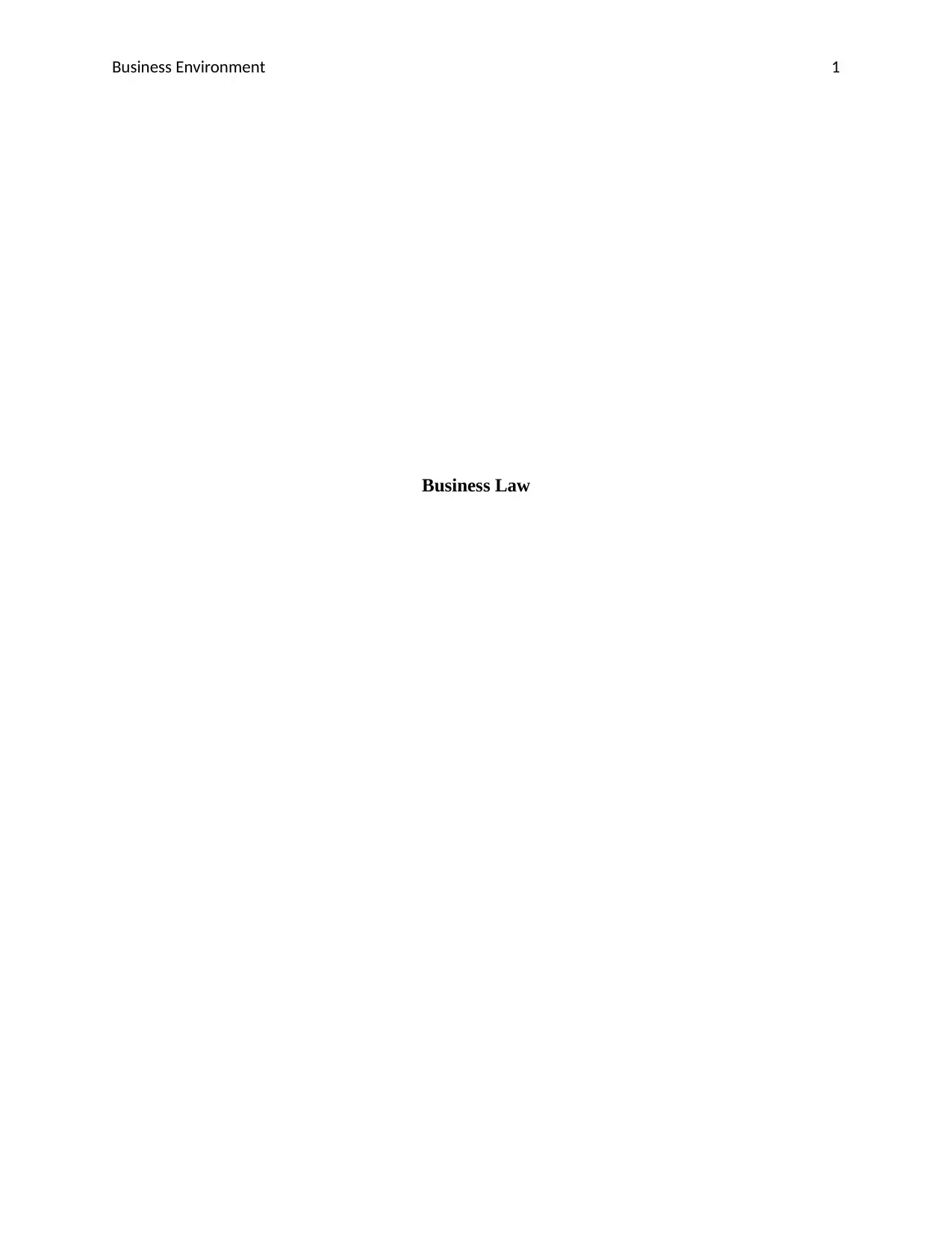
Business Environment 1
Business Law
Business Law
Secure Best Marks with AI Grader
Need help grading? Try our AI Grader for instant feedback on your assignments.
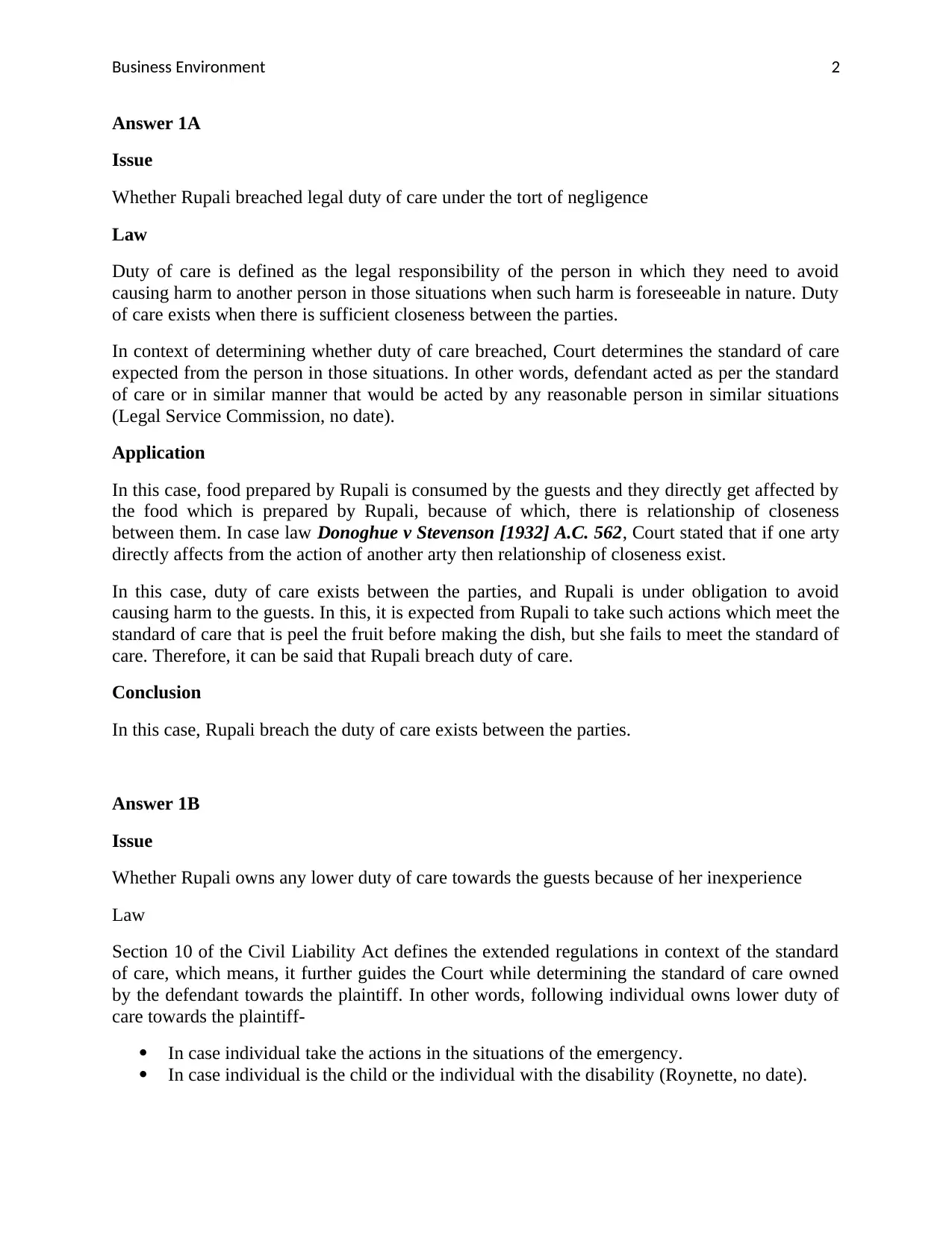
Business Environment 2
Answer 1A
Issue
Whether Rupali breached legal duty of care under the tort of negligence
Law
Duty of care is defined as the legal responsibility of the person in which they need to avoid
causing harm to another person in those situations when such harm is foreseeable in nature. Duty
of care exists when there is sufficient closeness between the parties.
In context of determining whether duty of care breached, Court determines the standard of care
expected from the person in those situations. In other words, defendant acted as per the standard
of care or in similar manner that would be acted by any reasonable person in similar situations
(Legal Service Commission, no date).
Application
In this case, food prepared by Rupali is consumed by the guests and they directly get affected by
the food which is prepared by Rupali, because of which, there is relationship of closeness
between them. In case law Donoghue v Stevenson [1932] A.C. 562, Court stated that if one arty
directly affects from the action of another arty then relationship of closeness exist.
In this case, duty of care exists between the parties, and Rupali is under obligation to avoid
causing harm to the guests. In this, it is expected from Rupali to take such actions which meet the
standard of care that is peel the fruit before making the dish, but she fails to meet the standard of
care. Therefore, it can be said that Rupali breach duty of care.
Conclusion
In this case, Rupali breach the duty of care exists between the parties.
Answer 1B
Issue
Whether Rupali owns any lower duty of care towards the guests because of her inexperience
Law
Section 10 of the Civil Liability Act defines the extended regulations in context of the standard
of care, which means, it further guides the Court while determining the standard of care owned
by the defendant towards the plaintiff. In other words, following individual owns lower duty of
care towards the plaintiff-
In case individual take the actions in the situations of the emergency.
In case individual is the child or the individual with the disability (Roynette, no date).
Answer 1A
Issue
Whether Rupali breached legal duty of care under the tort of negligence
Law
Duty of care is defined as the legal responsibility of the person in which they need to avoid
causing harm to another person in those situations when such harm is foreseeable in nature. Duty
of care exists when there is sufficient closeness between the parties.
In context of determining whether duty of care breached, Court determines the standard of care
expected from the person in those situations. In other words, defendant acted as per the standard
of care or in similar manner that would be acted by any reasonable person in similar situations
(Legal Service Commission, no date).
Application
In this case, food prepared by Rupali is consumed by the guests and they directly get affected by
the food which is prepared by Rupali, because of which, there is relationship of closeness
between them. In case law Donoghue v Stevenson [1932] A.C. 562, Court stated that if one arty
directly affects from the action of another arty then relationship of closeness exist.
In this case, duty of care exists between the parties, and Rupali is under obligation to avoid
causing harm to the guests. In this, it is expected from Rupali to take such actions which meet the
standard of care that is peel the fruit before making the dish, but she fails to meet the standard of
care. Therefore, it can be said that Rupali breach duty of care.
Conclusion
In this case, Rupali breach the duty of care exists between the parties.
Answer 1B
Issue
Whether Rupali owns any lower duty of care towards the guests because of her inexperience
Law
Section 10 of the Civil Liability Act defines the extended regulations in context of the standard
of care, which means, it further guides the Court while determining the standard of care owned
by the defendant towards the plaintiff. In other words, following individual owns lower duty of
care towards the plaintiff-
In case individual take the actions in the situations of the emergency.
In case individual is the child or the individual with the disability (Roynette, no date).
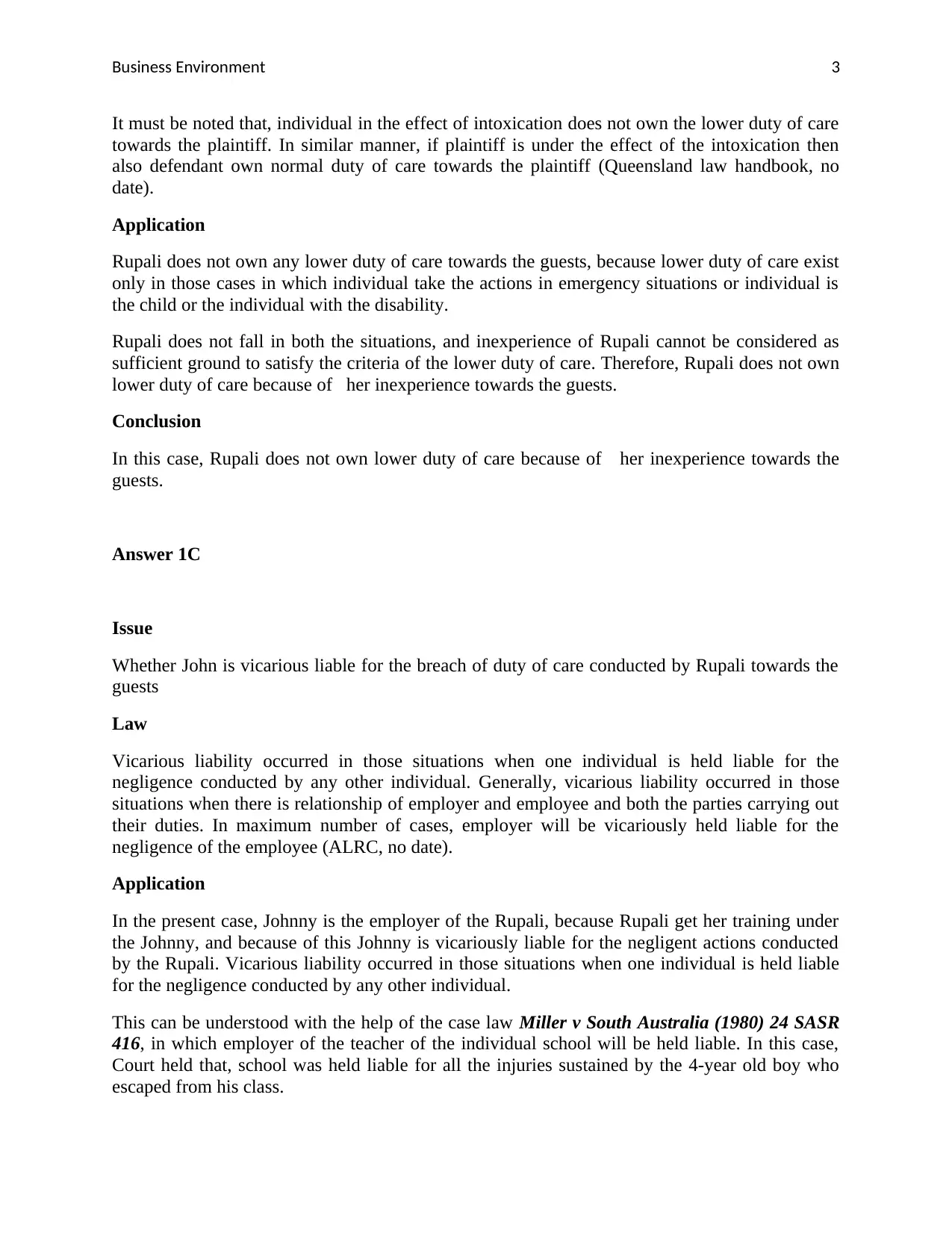
Business Environment 3
It must be noted that, individual in the effect of intoxication does not own the lower duty of care
towards the plaintiff. In similar manner, if plaintiff is under the effect of the intoxication then
also defendant own normal duty of care towards the plaintiff (Queensland law handbook, no
date).
Application
Rupali does not own any lower duty of care towards the guests, because lower duty of care exist
only in those cases in which individual take the actions in emergency situations or individual is
the child or the individual with the disability.
Rupali does not fall in both the situations, and inexperience of Rupali cannot be considered as
sufficient ground to satisfy the criteria of the lower duty of care. Therefore, Rupali does not own
lower duty of care because of her inexperience towards the guests.
Conclusion
In this case, Rupali does not own lower duty of care because of her inexperience towards the
guests.
Answer 1C
Issue
Whether John is vicarious liable for the breach of duty of care conducted by Rupali towards the
guests
Law
Vicarious liability occurred in those situations when one individual is held liable for the
negligence conducted by any other individual. Generally, vicarious liability occurred in those
situations when there is relationship of employer and employee and both the parties carrying out
their duties. In maximum number of cases, employer will be vicariously held liable for the
negligence of the employee (ALRC, no date).
Application
In the present case, Johnny is the employer of the Rupali, because Rupali get her training under
the Johnny, and because of this Johnny is vicariously liable for the negligent actions conducted
by the Rupali. Vicarious liability occurred in those situations when one individual is held liable
for the negligence conducted by any other individual.
This can be understood with the help of the case law Miller v South Australia (1980) 24 SASR
416, in which employer of the teacher of the individual school will be held liable. In this case,
Court held that, school was held liable for all the injuries sustained by the 4-year old boy who
escaped from his class.
It must be noted that, individual in the effect of intoxication does not own the lower duty of care
towards the plaintiff. In similar manner, if plaintiff is under the effect of the intoxication then
also defendant own normal duty of care towards the plaintiff (Queensland law handbook, no
date).
Application
Rupali does not own any lower duty of care towards the guests, because lower duty of care exist
only in those cases in which individual take the actions in emergency situations or individual is
the child or the individual with the disability.
Rupali does not fall in both the situations, and inexperience of Rupali cannot be considered as
sufficient ground to satisfy the criteria of the lower duty of care. Therefore, Rupali does not own
lower duty of care because of her inexperience towards the guests.
Conclusion
In this case, Rupali does not own lower duty of care because of her inexperience towards the
guests.
Answer 1C
Issue
Whether John is vicarious liable for the breach of duty of care conducted by Rupali towards the
guests
Law
Vicarious liability occurred in those situations when one individual is held liable for the
negligence conducted by any other individual. Generally, vicarious liability occurred in those
situations when there is relationship of employer and employee and both the parties carrying out
their duties. In maximum number of cases, employer will be vicariously held liable for the
negligence of the employee (ALRC, no date).
Application
In the present case, Johnny is the employer of the Rupali, because Rupali get her training under
the Johnny, and because of this Johnny is vicariously liable for the negligent actions conducted
by the Rupali. Vicarious liability occurred in those situations when one individual is held liable
for the negligence conducted by any other individual.
This can be understood with the help of the case law Miller v South Australia (1980) 24 SASR
416, in which employer of the teacher of the individual school will be held liable. In this case,
Court held that, school was held liable for all the injuries sustained by the 4-year old boy who
escaped from his class.
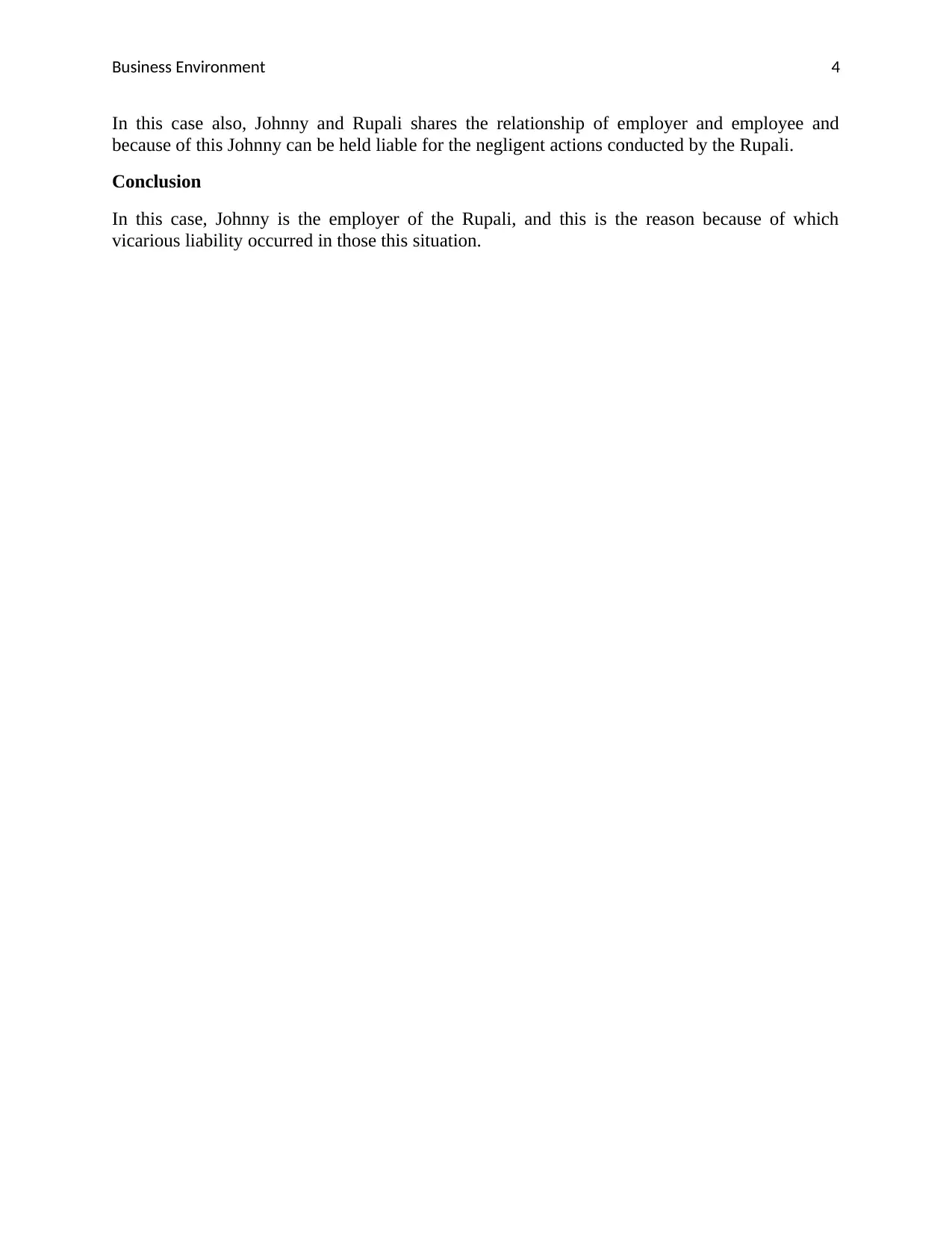
Business Environment 4
In this case also, Johnny and Rupali shares the relationship of employer and employee and
because of this Johnny can be held liable for the negligent actions conducted by the Rupali.
Conclusion
In this case, Johnny is the employer of the Rupali, and this is the reason because of which
vicarious liability occurred in those this situation.
In this case also, Johnny and Rupali shares the relationship of employer and employee and
because of this Johnny can be held liable for the negligent actions conducted by the Rupali.
Conclusion
In this case, Johnny is the employer of the Rupali, and this is the reason because of which
vicarious liability occurred in those this situation.
Secure Best Marks with AI Grader
Need help grading? Try our AI Grader for instant feedback on your assignments.
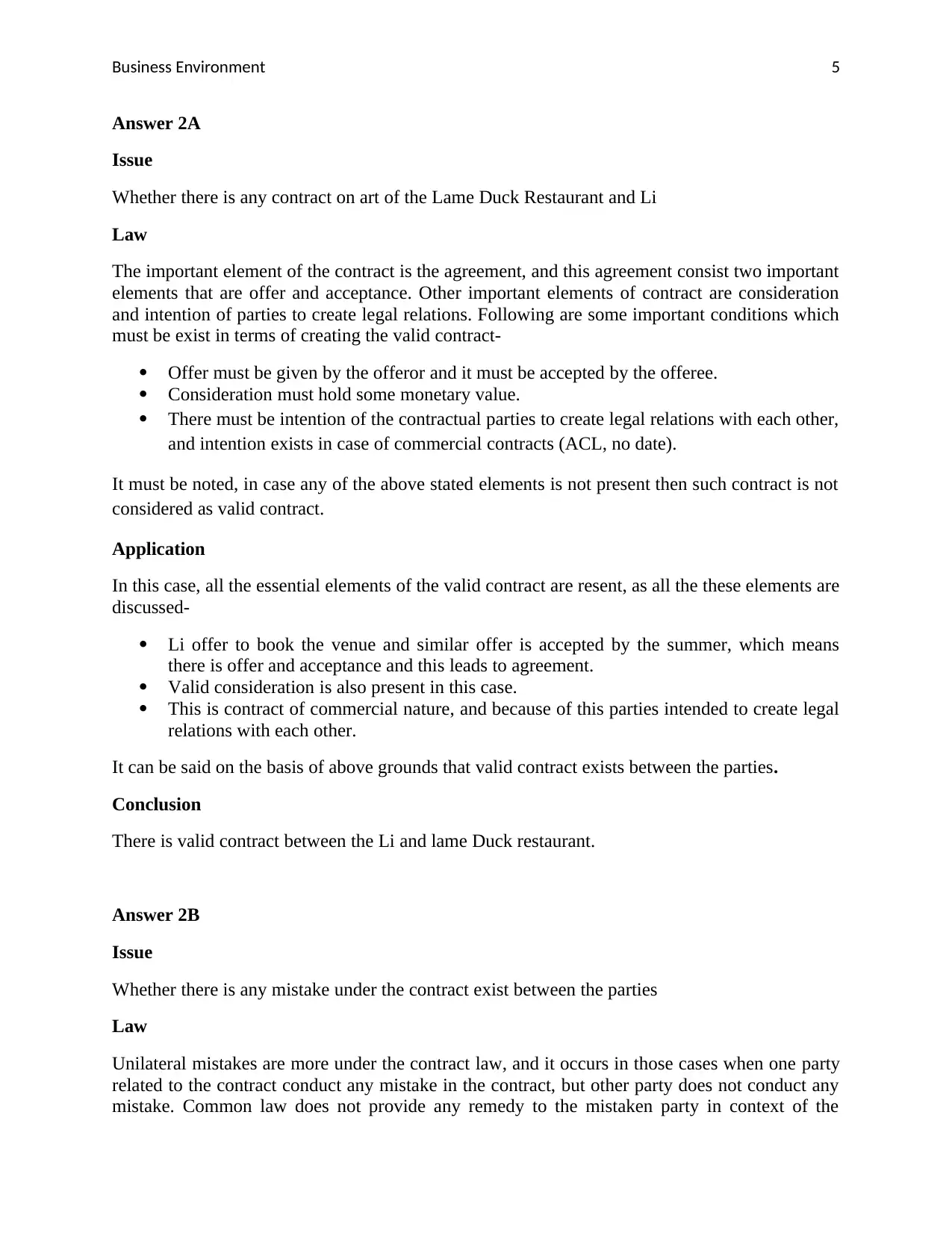
Business Environment 5
Answer 2A
Issue
Whether there is any contract on art of the Lame Duck Restaurant and Li
Law
The important element of the contract is the agreement, and this agreement consist two important
elements that are offer and acceptance. Other important elements of contract are consideration
and intention of parties to create legal relations. Following are some important conditions which
must be exist in terms of creating the valid contract-
Offer must be given by the offeror and it must be accepted by the offeree.
Consideration must hold some monetary value.
There must be intention of the contractual parties to create legal relations with each other,
and intention exists in case of commercial contracts (ACL, no date).
It must be noted, in case any of the above stated elements is not present then such contract is not
considered as valid contract.
Application
In this case, all the essential elements of the valid contract are resent, as all the these elements are
discussed-
Li offer to book the venue and similar offer is accepted by the summer, which means
there is offer and acceptance and this leads to agreement.
Valid consideration is also present in this case.
This is contract of commercial nature, and because of this parties intended to create legal
relations with each other.
It can be said on the basis of above grounds that valid contract exists between the parties.
Conclusion
There is valid contract between the Li and lame Duck restaurant.
Answer 2B
Issue
Whether there is any mistake under the contract exist between the parties
Law
Unilateral mistakes are more under the contract law, and it occurs in those cases when one party
related to the contract conduct any mistake in the contract, but other party does not conduct any
mistake. Common law does not provide any remedy to the mistaken party in context of the
Answer 2A
Issue
Whether there is any contract on art of the Lame Duck Restaurant and Li
Law
The important element of the contract is the agreement, and this agreement consist two important
elements that are offer and acceptance. Other important elements of contract are consideration
and intention of parties to create legal relations. Following are some important conditions which
must be exist in terms of creating the valid contract-
Offer must be given by the offeror and it must be accepted by the offeree.
Consideration must hold some monetary value.
There must be intention of the contractual parties to create legal relations with each other,
and intention exists in case of commercial contracts (ACL, no date).
It must be noted, in case any of the above stated elements is not present then such contract is not
considered as valid contract.
Application
In this case, all the essential elements of the valid contract are resent, as all the these elements are
discussed-
Li offer to book the venue and similar offer is accepted by the summer, which means
there is offer and acceptance and this leads to agreement.
Valid consideration is also present in this case.
This is contract of commercial nature, and because of this parties intended to create legal
relations with each other.
It can be said on the basis of above grounds that valid contract exists between the parties.
Conclusion
There is valid contract between the Li and lame Duck restaurant.
Answer 2B
Issue
Whether there is any mistake under the contract exist between the parties
Law
Unilateral mistakes are more under the contract law, and it occurs in those cases when one party
related to the contract conduct any mistake in the contract, but other party does not conduct any
mistake. Common law does not provide any remedy to the mistaken party in context of the
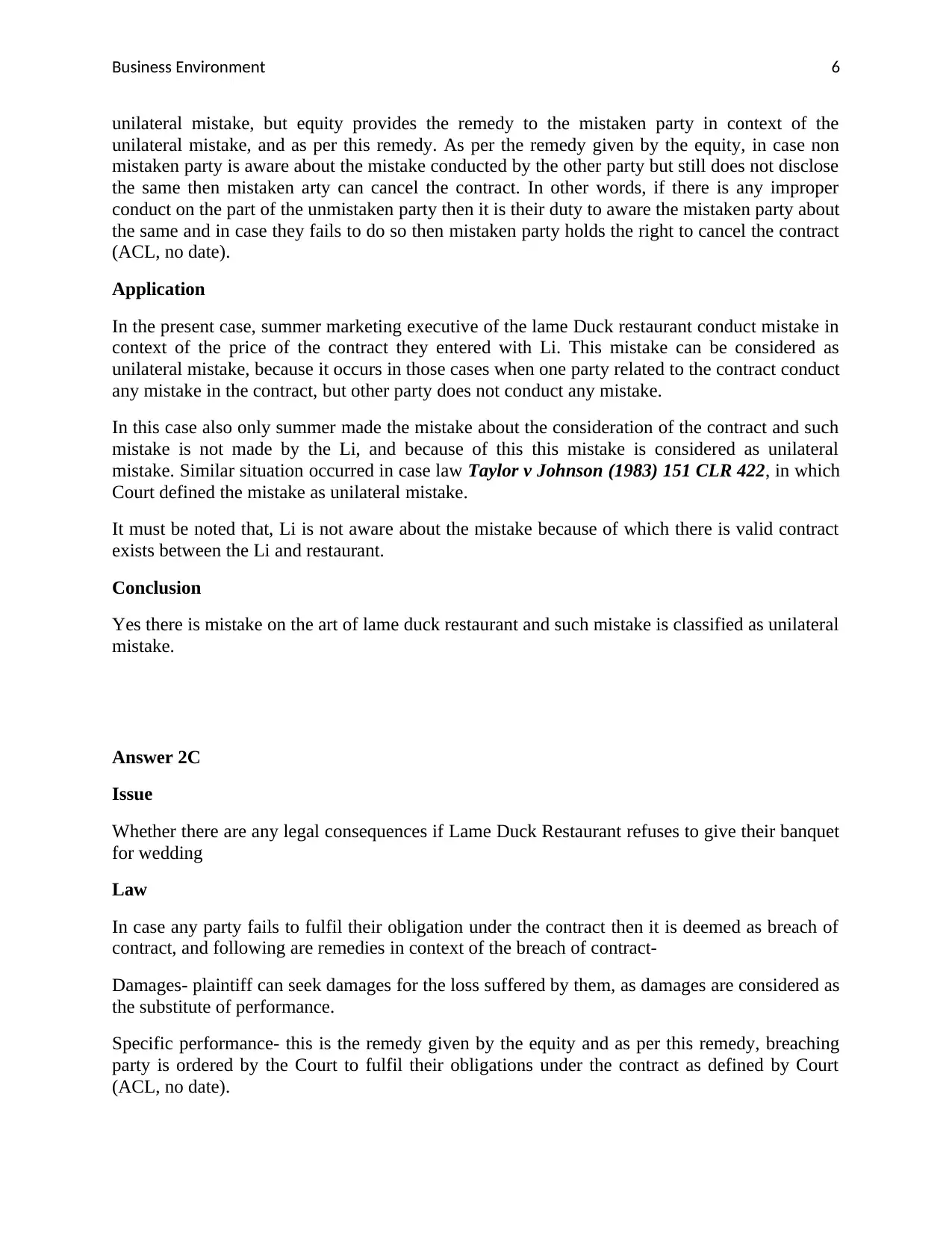
Business Environment 6
unilateral mistake, but equity provides the remedy to the mistaken party in context of the
unilateral mistake, and as per this remedy. As per the remedy given by the equity, in case non
mistaken party is aware about the mistake conducted by the other party but still does not disclose
the same then mistaken arty can cancel the contract. In other words, if there is any improper
conduct on the part of the unmistaken party then it is their duty to aware the mistaken party about
the same and in case they fails to do so then mistaken party holds the right to cancel the contract
(ACL, no date).
Application
In the present case, summer marketing executive of the lame Duck restaurant conduct mistake in
context of the price of the contract they entered with Li. This mistake can be considered as
unilateral mistake, because it occurs in those cases when one party related to the contract conduct
any mistake in the contract, but other party does not conduct any mistake.
In this case also only summer made the mistake about the consideration of the contract and such
mistake is not made by the Li, and because of this this mistake is considered as unilateral
mistake. Similar situation occurred in case law Taylor v Johnson (1983) 151 CLR 422, in which
Court defined the mistake as unilateral mistake.
It must be noted that, Li is not aware about the mistake because of which there is valid contract
exists between the Li and restaurant.
Conclusion
Yes there is mistake on the art of lame duck restaurant and such mistake is classified as unilateral
mistake.
Answer 2C
Issue
Whether there are any legal consequences if Lame Duck Restaurant refuses to give their banquet
for wedding
Law
In case any party fails to fulfil their obligation under the contract then it is deemed as breach of
contract, and following are remedies in context of the breach of contract-
Damages- plaintiff can seek damages for the loss suffered by them, as damages are considered as
the substitute of performance.
Specific performance- this is the remedy given by the equity and as per this remedy, breaching
party is ordered by the Court to fulfil their obligations under the contract as defined by Court
(ACL, no date).
unilateral mistake, but equity provides the remedy to the mistaken party in context of the
unilateral mistake, and as per this remedy. As per the remedy given by the equity, in case non
mistaken party is aware about the mistake conducted by the other party but still does not disclose
the same then mistaken arty can cancel the contract. In other words, if there is any improper
conduct on the part of the unmistaken party then it is their duty to aware the mistaken party about
the same and in case they fails to do so then mistaken party holds the right to cancel the contract
(ACL, no date).
Application
In the present case, summer marketing executive of the lame Duck restaurant conduct mistake in
context of the price of the contract they entered with Li. This mistake can be considered as
unilateral mistake, because it occurs in those cases when one party related to the contract conduct
any mistake in the contract, but other party does not conduct any mistake.
In this case also only summer made the mistake about the consideration of the contract and such
mistake is not made by the Li, and because of this this mistake is considered as unilateral
mistake. Similar situation occurred in case law Taylor v Johnson (1983) 151 CLR 422, in which
Court defined the mistake as unilateral mistake.
It must be noted that, Li is not aware about the mistake because of which there is valid contract
exists between the Li and restaurant.
Conclusion
Yes there is mistake on the art of lame duck restaurant and such mistake is classified as unilateral
mistake.
Answer 2C
Issue
Whether there are any legal consequences if Lame Duck Restaurant refuses to give their banquet
for wedding
Law
In case any party fails to fulfil their obligation under the contract then it is deemed as breach of
contract, and following are remedies in context of the breach of contract-
Damages- plaintiff can seek damages for the loss suffered by them, as damages are considered as
the substitute of performance.
Specific performance- this is the remedy given by the equity and as per this remedy, breaching
party is ordered by the Court to fulfil their obligations under the contract as defined by Court
(ACL, no date).
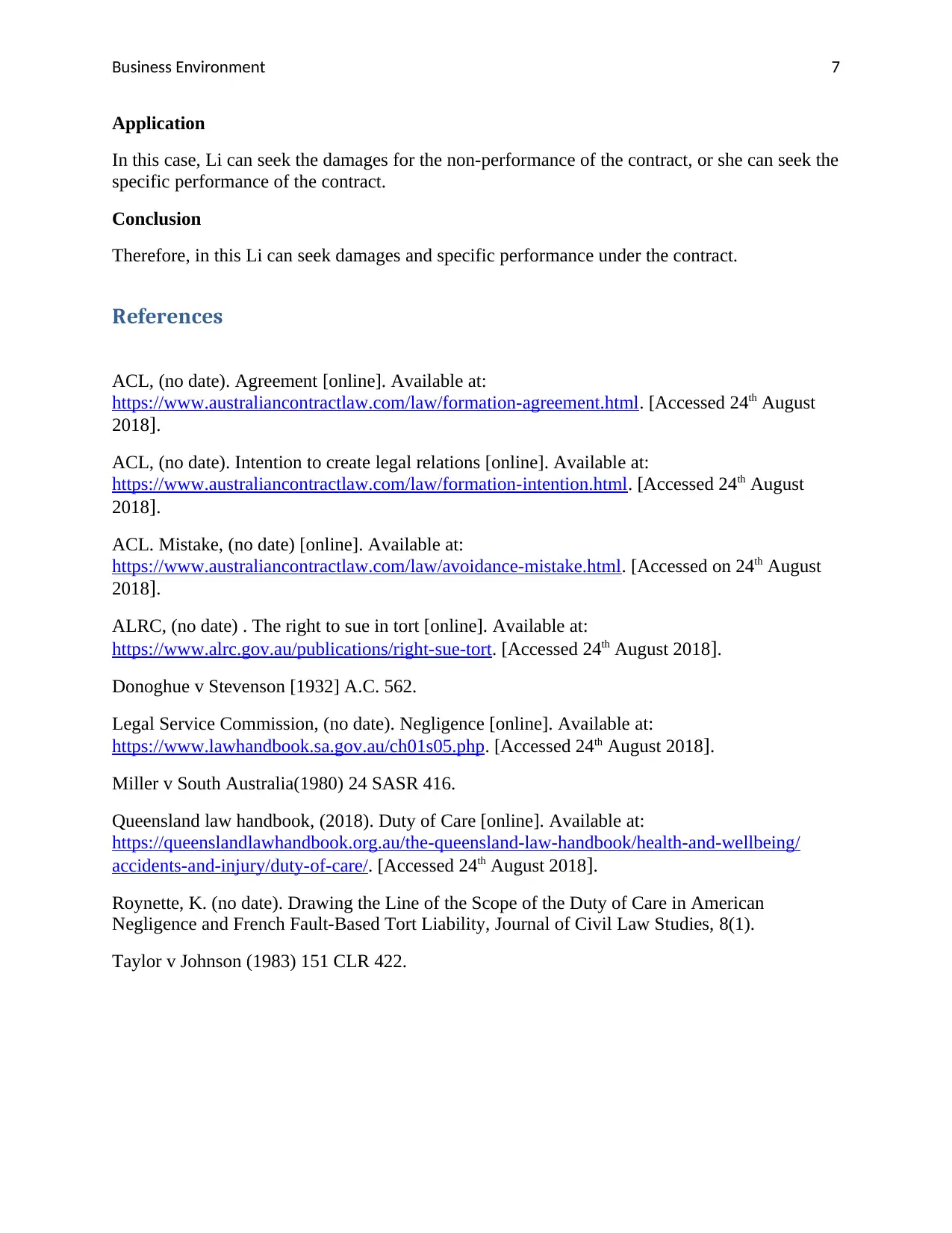
Business Environment 7
Application
In this case, Li can seek the damages for the non-performance of the contract, or she can seek the
specific performance of the contract.
Conclusion
Therefore, in this Li can seek damages and specific performance under the contract.
References
ACL, (no date). Agreement [online]. Available at:
https://www.australiancontractlaw.com/law/formation-agreement.html. [Accessed 24th August
2018].
ACL, (no date). Intention to create legal relations [online]. Available at:
https://www.australiancontractlaw.com/law/formation-intention.html. [Accessed 24th August
2018].
ACL. Mistake, (no date) [online]. Available at:
https://www.australiancontractlaw.com/law/avoidance-mistake.html. [Accessed on 24th August
2018].
ALRC, (no date) . The right to sue in tort [online]. Available at:
https://www.alrc.gov.au/publications/right-sue-tort. [Accessed 24th August 2018].
Donoghue v Stevenson [1932] A.C. 562.
Legal Service Commission, (no date). Negligence [online]. Available at:
https://www.lawhandbook.sa.gov.au/ch01s05.php. [Accessed 24th August 2018].
Miller v South Australia(1980) 24 SASR 416.
Queensland law handbook, (2018). Duty of Care [online]. Available at:
https://queenslandlawhandbook.org.au/the-queensland-law-handbook/health-and-wellbeing/
accidents-and-injury/duty-of-care/. [Accessed 24th August 2018].
Roynette, K. (no date). Drawing the Line of the Scope of the Duty of Care in American
Negligence and French Fault-Based Tort Liability, Journal of Civil Law Studies, 8(1).
Taylor v Johnson (1983) 151 CLR 422.
Application
In this case, Li can seek the damages for the non-performance of the contract, or she can seek the
specific performance of the contract.
Conclusion
Therefore, in this Li can seek damages and specific performance under the contract.
References
ACL, (no date). Agreement [online]. Available at:
https://www.australiancontractlaw.com/law/formation-agreement.html. [Accessed 24th August
2018].
ACL, (no date). Intention to create legal relations [online]. Available at:
https://www.australiancontractlaw.com/law/formation-intention.html. [Accessed 24th August
2018].
ACL. Mistake, (no date) [online]. Available at:
https://www.australiancontractlaw.com/law/avoidance-mistake.html. [Accessed on 24th August
2018].
ALRC, (no date) . The right to sue in tort [online]. Available at:
https://www.alrc.gov.au/publications/right-sue-tort. [Accessed 24th August 2018].
Donoghue v Stevenson [1932] A.C. 562.
Legal Service Commission, (no date). Negligence [online]. Available at:
https://www.lawhandbook.sa.gov.au/ch01s05.php. [Accessed 24th August 2018].
Miller v South Australia(1980) 24 SASR 416.
Queensland law handbook, (2018). Duty of Care [online]. Available at:
https://queenslandlawhandbook.org.au/the-queensland-law-handbook/health-and-wellbeing/
accidents-and-injury/duty-of-care/. [Accessed 24th August 2018].
Roynette, K. (no date). Drawing the Line of the Scope of the Duty of Care in American
Negligence and French Fault-Based Tort Liability, Journal of Civil Law Studies, 8(1).
Taylor v Johnson (1983) 151 CLR 422.
1 out of 7
Related Documents
Your All-in-One AI-Powered Toolkit for Academic Success.
+13062052269
info@desklib.com
Available 24*7 on WhatsApp / Email
![[object Object]](/_next/static/media/star-bottom.7253800d.svg)
Unlock your academic potential
© 2024 | Zucol Services PVT LTD | All rights reserved.


